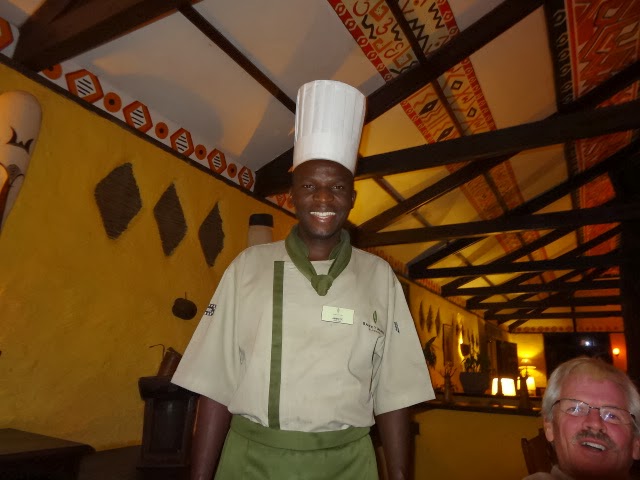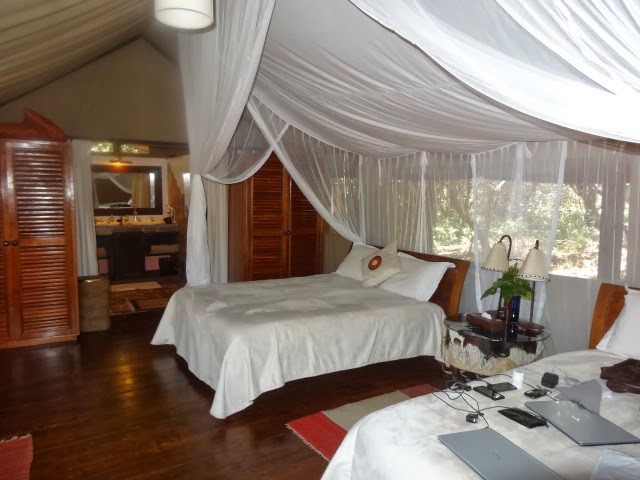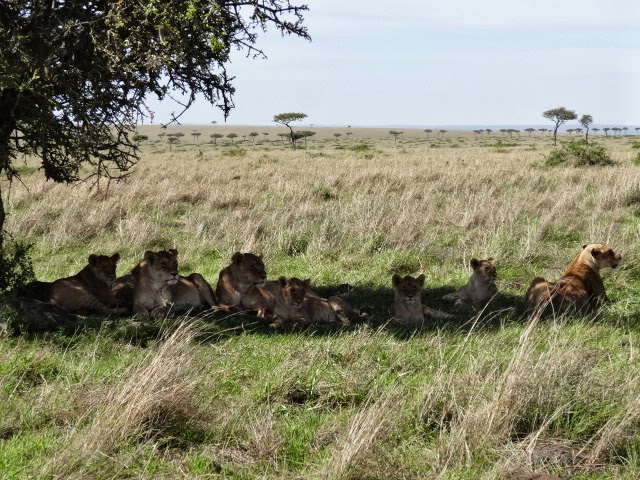 Tom, Anderson, and me, posing at the Kenya/Tanzania border marker, still smiling but not objecting when it was time to head back to the Masai Mara.
Tom, Anderson, and me, posing at the Kenya/Tanzania border marker, still smiling but not objecting when it was time to head back to the Masai Mara.
Today’s photos are from the post on this date in 2013 while on safari, staying at Camp Olonana in the Maasai Mara, Kenya. For more on this date, please click here.
 |
| Finally, we were able to stand at the marker that separates Kenya from Tanzania, which poses an excellent opportunity for all of us. |
A popular expression frequently used by Indian people is “Done, done, done,” when asking them for assistance. They couldn’t be more eager to please. We appreciate them, their kindness, and their excellent service. Living in this hotel for so long with a frequent turnover of staff, leaving for a break for a few weeks to return to their homes to be with family, it’s no wonder consistency is not always possible.
 |
| I know I looked goofy with my Bugs Away hat, a scarf tied on my face. Honestly, I didn’t care. If I’d had a paper bag on hand, I’d have worn that. We did everything we could to keep the flies out of our noses, mouths, and ears. |
Has anyone you know lived in a hotel for 205 days, unless, of course, they are a celebrity and make a hotel their permanent residency? We are no celebrities. And, if we were, we’d probably be in a much different situation. But, it’s only from the same services repeatedly, often due to the rotating staff, that inconsistencies become more prevalent and, subsequently, more evident after such an extended stay.
 |
| Unable to get as close as we’d like due to the rough terrain, we did our best to zoom in to get the following photos on the remaining wildebeests. |
Tom says, “The only consistency is the inconsistency.” I’ve laughed each time he says this, always with the intent of dampening our momentary frustration.
 |
| They were increasing in numbers as we approached the border. |
In many businesses throughout the world, consistency becomes a top priority. One can always count on the lettuce being in the same spot in the grocery store, the shoes in a specific area in a department store, the sunscreen on the same shelf in the pharmacy, and so on.
 |
| Although the sight of the two-plus million wildebeest would have been unbelievable, I began to wonder if doing so was as vital to me as it had been in the past. It may sound as if it’s a rationalization for not having been able to see it, but the flies were a huge deterrent for both of us. They were flying into our noses, mouths, and ears. It wasn’t perfect. |
In the restaurant business, if you formerly dined at, for example, the Cheesecake Factory for their strawberry cheesecake, you’d expect the same flavor, the same sized portion, the same taste, and at least for a time, the same price.
 |
| No more than a few minutes into the return drive, on our way back to Kenya, we spotted a mom and baby elephant, tails swishing batting off the flies. They, too, must feel the effects of the dung of millions of animals. |
In our almost eight years of world travel, we’ve found a profound lack of consistency in dining when returning to the same establishments for a repeated menu item or, as in the case here in our lovely Mumbai hotel, ordering the same breakfast items and the same dinner items, day after day, which are often different in portion size, taste, and appearance almost every time they arrive by room service.
But if I don’t repeat this same order each day, after 205 days, something won’t be right. I’d love to say, “The usual, please.” My order changes from time to time as I fine-tune my diet to keep the carb count to a minimum. So, I realize I must be particular regarding my orders. It’s never the same two days in a row. Breakfast tends to be pretty consistent, although we often have to remind the restaurant when we call to make the bacon crispy instead of it swimming in grease when half done. Tom orders the same breakfast every day; cheese omelet, eight pieces of crispy bacon, and bananas every day and the same dinner every night.
 |
| After about an hour into the return drive, we saw the last of the wildebeest stragglers, facing a long walk home to the Serengeti in Tanzania. (80% of the Serengeti is in Tanzania, with the remaining 20% in Kenya). |
It isn’t that they don’t want to please. They do more than anywhere we’ve been in the past. It boils down to the person taking the order, which varies from time to time, and the chefs preparing the food. Last night, only having ordered the same grilled boneless chicken legs, side orders of steamed broccoli, and spinach, night after night, my dinner arrived with only half as much chicken as usual and twice as many vegetables. Go figure.
 |
| The giraffes walked along the hillside at our camp as we wearily strolled to the restaurant at Camp Olonana for late lunch, cold beverages, and time to regroup for the upcoming afternoon drive. |
Tonight, when I order the same dinner again, but this time I’ll mention “More chicken please.” I won’t say, “Fewer vegetables, please.” If I do, I’ll get too tiny a portion of each of these two vegetables. Instead, I’ll eat whatever I get.
I’ve stopped requesting my vegetables to be sauteed with garlic. They know I don’t use any vegetable oils, and I’ve asked that they only use butter to prepare my food, but everything was always swimming in butter, maybe the equivalent of three or four tablespoons. Now, I order the butter on the side and use about one tablespoon between my two vegetables.
 |
| The Maasai gathered up their cows to return them to the village’s security, close to our camp, away from the risk of attack. |
It’s the same thing when cleaning our room. The towel count became consistent after about two months, so we’re good there. I suggested they don’t change our sheets daily to every other three days, which is OK with us, but they continue to change the sheets daily. I’ve stopped asking.
 |
| The “Retired Generals” lined up to welcome us back to the Maasai Mara. |
We don’t use their lotion and ask they don’t leave tubes of lotion. The counter space in the bathroom is limited. With no drawers or a medicine cabinet, we leave all of the toiletries we use on the countertop. This will never be resolved.
But, more importantly, we’ve requested with hotel management that all room cleaners have been staying overnight in the hotel for no less than three weeks. If they contracted the virus on their off days, they could easily infect us when spending 30 minutes in our tiny room each day.
 |
| And then, there were elephants lumbering across the road only feet from our vehicle. |
Invariably, even with their masks on, I’ve learned to recognize their hairstyles (all men), and over and over again, I end up asking, “How long have you been staying in the hotel?” They say fifty percent of the time, considerably less than three weeks, many less than one week. We prevent those cleaners from entering our room, asking them to find someone who has been here for three weeks or longer. They always comply, eager to please.
Oddly, keeping tabs on all of this is practically a job in itself. After all these months in lockdown, we’re desperately trying to ensure we don’t become infected. Over and over again, it’s repeated on the local news that there are no available hospital beds or ICU beds available in any hospital in Mumbai. That certainly is a frightening thought.
 |
| As the landscape became less cluttered and the flies no longer nipped at us, we were happy to be returning to the Maasai Mara. |
Today, listening on to a podcast with Minnesota’s well-known virologist, Dr. Michael Osterholm, he said Minnesota, North and South Dakota, and Wisconsin are only days away from running out of hospital beds, the main reason, along with the rising numbers of cases, we have no interest in returning to the US at this time.
Instead, we stay hunkered down in Mumbai, not in a state of angst, but a state of acceptance, that we could be here for many more months to come. If somehow, we could pin down “consistency,” it might become a little easier…or not.
Be well.
Photo from one year ago today, October 14, 2019:
 |
| Tom’s lunch at a restaurant in Chepstow, Wales. He’d undoubtedly enjoy this now! For more photos, please click here. |










 The comfy furnishings made it tempting to lay here and watch the wildlife stroll or swim past from time to time. We only had time to sit here for one hour during the three days.
The comfy furnishings made it tempting to lay here and watch the wildlife stroll or swim past from time to time. We only had time to sit here for one hour during the three days. Although we were escorted to our tent the first time, Tom wanted to handle the long, sturdy zipper to ensure no issues. Of course, it was a breeze, opening to a virtual paradise of tent interiors.
Although we were escorted to our tent the first time, Tom wanted to handle the long, sturdy zipper to ensure no issues. Of course, it was a breeze, opening to a virtual paradise of tent interiors.






















